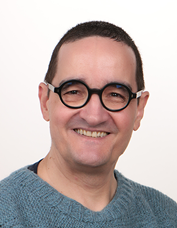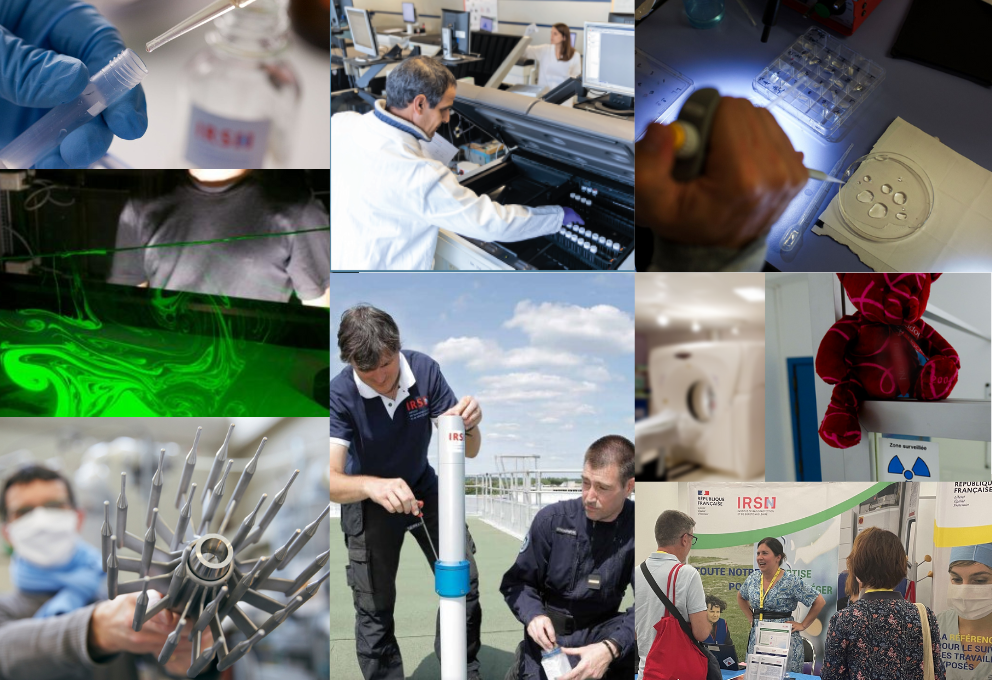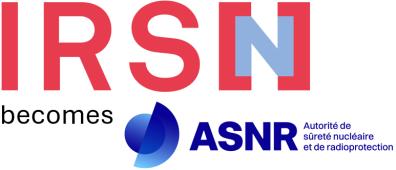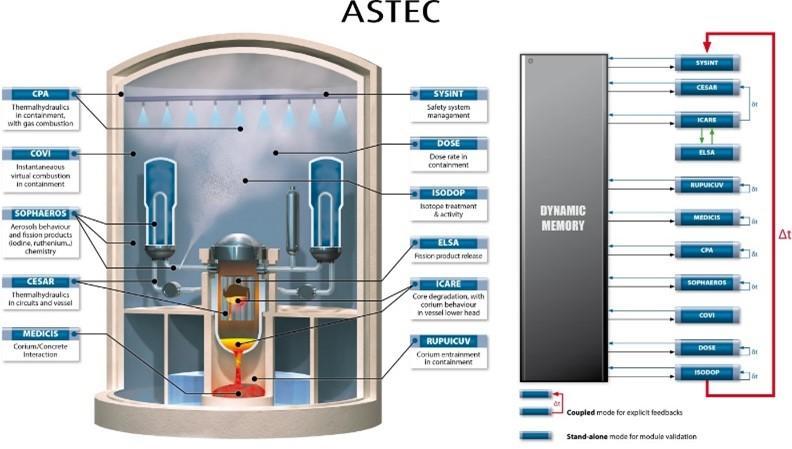International Business Development Unit (BU-DCI)

A team responsible for promoting the IRSN’s expertise and experience and implementing a wide range of services to support foreign nuclear safety authorities and TSOs in the context of tenders or bilateral contracts.
The team
- A Director
- A Deputy director
- An administrative assistant
- An administrative and financial manager
- Six international development engineers
- Occasional student trainees in geopolitics

Jean-René Jourdain serves as Executive Director for International Business Development at the French Institute for Radiological Protection and Nuclear Safety (IRSN) since January 2021.
His main current activity consists of managing a 10-experts unit in charge of responding to international tenders and managing contracts in support of nuclear safety authorities and their TSOs, in particular in Armenia, Morocco, Norway, the Netherlands, Turkey and Ukraine.
He joined the IRSN in May 2000 and was successively appointed as Head of the Internal Dose Assessment and Modelling Laboratory (2000-2003), Head of the Internal Dosimetry Department (2003-2008), Representative of the Director of Radiological Protection in International Partnerships (2008-2012), Deputy Director of Radiological Protection and Health (2012-2017), and Deputy Director of International Affairs (2017-2021). He previously worked as a radiopharmacist in several hospitals in Paris (1992-1999), and as a pharmacist in charge of doping issues at the French Ministry of Youth and Sports (1999-2000).
Jean-René Jourdain holds a PhD in radiobiology and radiopathology (1997), a doctorate in pharmacy (1996), and a master’s degree in health law (1994) from the University of Paris, France.
He was an expert of the European HLEG on low-dose risk research in 2008-2009 and has been involved in several past EC-funded projects, e.g. DoReMi (WP leader, FP7, 2010-2015; project on radiation-induced non-cancer effects), OPERRA (Coordinator, FP7, 2013-2017; project on integration of European research in radiation protection), CONCERT (2015-2020; European Joint Programming Instrument in Radiation Protection Research) and MEDIRAD (2017-2021; project on the medical uses of ionizing radiation).
Jean-René Jourdain’s other professional activities include chairing the Nuclear and Radiological Threats Working Group within the Global Health Security Initiative, which brings together Ministries and Secretaries of Health from G7 countries (2007-2014) and chairing a UNSCEAR expert group to assess the doses and health effects of workers involved in the Fukushima Daiichi nuclear facilities (2011-2017).
Jean-René Jourdain plays a key role in expanding IRSN's activities globally by promoting the institute's expertise and establishing international partnerships to enhance nuclear safety on an international scale.
The team of the International Business Development Unit at IRSN comprises highly qualified and dedicated professionals who play a crucial role in expanding IRSN's activities on the global stage. This dynamic team is tasked with promoting IRSN's expertise in radiation protection, nuclear safety, and nuclear risk management internationally.
The members of this team possess a deep understanding of international issues related to radiation protection and nuclear safety. They work closely with international partners, regulatory bodies, government institutions, nuclear energy sector companies, and other stakeholders to develop joint projects, training programs, advisory services, and customized solutions.
Providing support for Nuclear Safety Authorities and TSOs
- An offer customized to meet the applicant's specific needs.
- This offer may encompass training and mentorship activities, including on-the-job training.
- It may also involve visits to facilities and research platforms.
IRSN/DAEI/BU-DCI may choose to respond independently or collaborate within a consortium to leverage maximum synergy and complementarity among its members.
Unlocking the IRSN Advantage in Nuclear Expertise

At IRSN, we pride ourselves on being your premier partner in nuclear safety and radiological protection. When comparing our services to those of our competitors, it becomes clear why we should be your top choice:
All-Inclusive Expertise: While others may offer specialized services, IRSN provides a comprehensive, one-stop solution. Our multidisciplinary approach means you get a complete package of expertise, ensuring your nuclear safety needs are fully addressed.
Global Connections: We don't just operate locally; we thrive globally. IRSN has a stellar track record of collaborating with prestigious international organizations. When you work with us, you tap into a worldwide network of knowledge and best practices, giving you a competitive edge on the global stage.
Driving Innovation: We're not content with the status quo. IRSN actively participates in cutting-edge research initiatives, staying ahead of the curve in nuclear safety and radiological protection. When you partner with us, you're aligning your organization with pioneers in the field.
Rapid Response Capability: Emergencies can strike at any time. What sets IRSN apart is our swift and efficient response to radiological crises. We're your trusted ally when it matters most, ensuring minimal downtime and maximum peace of mind.
Shaping Industry Standards: IRSN's commitment to R&D isn't just for our benefit; it's for the benefit of the entire industry. By choosing IRSN, you're contributing to the advancement of international radiological safety standards and positioning your organization as a forward-thinking leader.
In conclusion, IRSN offers a compelling package of expertise and support that surpasses our competitors. We're not just a service provider; we're your strategic partner in ensuring the highest standards of nuclear safety and radiological protection. Don't settle for less; choose IRSN for excellence in nuclear expertise.
"Due to its long experience in using nuclear power, France is one of the most advanced nations in the world in the field of radioactive waste management. The IRSN is very present in international conferences and workshops on this subject in order to share the results of its research conducted in support of its expertise work. Its work is regularly cited.
Our team is regularly called upon to act as experts for the IAEA to evaluate waste management methods in other countries or to contribute to the development of the international doctrine to ensure the safety of waste. We also participate in many workshops and trainings aimed at training countries that are initiating their waste management programs."
Amélie De Hoyos (Safety assessment of radioactive waste disposal)
ASTEC: Strengthen Nuclear Safety with IRSN's Expertise
A significant part of IRSN's mission involves developing and providing cutting-edge tools for the nuclear industry, regulatory authorities, researchers, and organizations involved in nuclear risk management. Among these tools, ASTEC (Accident Source Term Evaluation Code) stands out as one of the most crucial. ASTEC is an advanced software developed for assessing the consequences of severe accidents in nuclear facilities, offering vital insights to enhance nuclear safety and create effective emergency response plans.
Here's why you should consider acquiring ASTEC from IRSN:
- Expertise from IRSN: IRSN is an internationally renowned organization in the field of nuclear safety. By choosing ASTEC, you gain access to the expertise of our researchers and engineers who contributed to the development of this code.
- Enhanced Safety: ASTEC allows for a better understanding and assessment of severe accident scenarios in nuclear power plants, thereby contributing to the safety of these installations.
- International Collaboration: ASTEC was developed in collaboration with other European nuclear safety organizations has been developed by IRSN since the 1990s, involving the feedback of the numerous users overworld, making it a benchmark tool for assessing nuclear accidents.
- European reference tool: it received a significant support from the European Commission, through several EURATOM projects PCRD, H202, SNETP programs and more recently Horizon Europe programs. Today 28 Europan entities are using and validating ASTEC through the ASCOM network. It is also used outside Europe: China, India, Canada, …. Those collaborations have expanded ASTEC’S scope to include the progression and mitigation of major accidents in various type of facilities, including light water reactor (PWR, VVER, EPR, BWR, HPR1000, …), heavy water reactors (CANDU), experimental and naval reactors, and fuel cycle facilities.
- Participating to the new development of nuclear: the European users are working together to expand modeling and validation of ASTEC for SMRs and AMRs including micro reactors
- CAPACITY building: ASTEC is identified to participate into the training of the new generation of nuclear professionals and emergency preparedness and response actions.
- Continuous Updates: IRSN is committed to continually maintaining and improving ASTEC to incorporate the latest advancements in nuclear safety.
By acquiring ASTEC, you are investing in the security and safety of nuclear facilities, whether you are an operator, regulator, researcher, or a professional in the industry. Our calculation codes are designed to provide critical information and contribute to more effective nuclear risk management.
For more information on the availability of ASTEC and our other software tools, please do not hesitate to contact us.
"Validation efforts have established ASTEC as a reference tool used today in about twenty countries. It is utilized by academics, technical support organizations, regulatory authorities, engineering firms, and nuclear industry stakeholders. Over 30 usage licenses are granted worldwide, for both research and development purposes and commercial applications.
The ASTEC User Group facilitates the exchange of experiences and knowledge, contributing to the continuous improvement of the software's physical models and capabilities. This approach, enriched by the feedback from numerous users, has played a significant role in enhancing the safety of nuclear installations."
Patrick Drai & Jean-Marc Such (ASTEC license Managers)

